Reference management. Clean and simple.

How to prepare an excellent thesis defense

What is a thesis defense?
How long is a thesis defense, what happens at a thesis defense, your presentation, questions from the committee, 6 tips to help you prepare for your thesis defense, 1. anticipate questions and prepare for them, 2. dress for success, 3. ask for help, as needed, 4. have a backup plan, 5. prepare for the possibility that you might not know an answer, 6. de-stress before, during, and after, frequently asked questions about preparing an excellent thesis defense, related articles.
If you're about to complete, or have ever completed a graduate degree, you have most likely come across the term "thesis defense." In many countries, to finish a graduate degree, you have to write a thesis .
A thesis is a large paper, or multi-chapter work, based on a topic relating to your field of study.
Once you hand in your thesis, you will be assigned a date to defend your work. Your thesis defense meeting usually consists of you and a committee of two or more professors working in your program. It may also include other people, like professionals from other colleges or those who are working in your field.
During your thesis defense, you will be asked questions about your work. The main purpose of your thesis defense is for the committee to make sure that you actually understand your field and focus area.
The questions are usually open-ended and require the student to think critically about their work. By the time of your thesis defense, your paper has already been evaluated. The questions asked are not designed so that you actually have to aggressively "defend" your work; often, your thesis defense is more of a formality required so that you can get your degree.
- Check with your department about requirements and timing.
- Re-read your thesis.
- Anticipate questions and prepare for them.
- Create a back-up plan to deal with technology hiccups.
- Plan de-stressing activities both before, and after, your defense.
How long your oral thesis defense is depends largely on the institution and requirements of your degree. It is best to consult your department or institution about this. In general, a thesis defense may take only 20 minutes, but it may also take two hours or more. The length also depends on how much time is allocated to the presentation and questioning part.
Tip: Check with your department or institution as soon as possible to determine the approved length for a thesis defense.
First of all, be aware that a thesis defense varies from country to country. This is just a general overview, but a thesis defense can take many different formats. Some are closed, others are public defenses. Some take place with two committee members, some with more examiners.
The same goes for the length of your thesis defense, as mentioned above. The most important first step for you is to clarify with your department what the structure of your thesis defense will look like. In general, your thesis defense will include:
- your presentation of around 20-30 minutes
- questions from the committee
- questions from the audience (if the defense is public and the department allows it)
You might have to give a presentation, often with Powerpoint, Google slides, or Keynote slides. Make sure to prepare an appropriate amount of slides. A general rule is to use about 10 slides for a 20-minute presentation.
But that also depends on your specific topic and the way you present. The good news is that there will be plenty of time ahead of your thesis defense to prepare your slides and practice your presentation alone and in front of friends or family.
Tip: Practice delivering your thesis presentation in front of family, friends, or colleagues.
You can prepare your slides by using information from your thesis' first chapter (the overview of your thesis) as a framework or outline. Substantive information in your thesis should correspond with your slides.
Make sure your slides are of good quality— both in terms of the integrity of the information and the appearance. If you need more help with how to prepare your presentation slides, both the ASQ Higher Education Brief and James Hayton have good guidelines on the topic.
The committee will ask questions about your work after you finish your presentation. The questions will most likely be about the core content of your thesis, such as what you learned from the study you conducted. They may also ask you to summarize certain findings and to discuss how your work will contribute to the existing body of knowledge.
Tip: Read your entire thesis in preparation of the questions, so you have a refreshed perspective on your work.
While you are preparing, you can create a list of possible questions and try to answer them. You can foresee many of the questions you will get by simply spending some time rereading your thesis.
Here are a few tips on how to prepare for your thesis defense:
You can absolutely prepare for most of the questions you will be asked. Read through your thesis and while you're reading it, create a list of possible questions. In addition, since you will know who will be on the committee, look at the academic expertise of the committee members. In what areas would they most likely be focused?
If possible, sit at other thesis defenses with these committee members to get a feel for how they ask and what they ask. As a graduate student, you should generally be adept at anticipating test questions, so use this advantage to gather as much information as possible before your thesis defense meeting.
Your thesis defense is a formal event, often the entire department or university is invited to participate. It signals a critical rite of passage for graduate students and faculty who have supported them throughout a long and challenging process.
While most universities don't have specific rules on how to dress for that event, do regard it with dignity and respect. This one might be a no-brainer, but know that you should dress as if you were on a job interview or delivering a paper at a conference.
It might help you deal with your stress before your thesis defense to entrust someone with the smaller but important responsibilities of your defense well ahead of schedule. This trusted person could be responsible for:
- preparing the room of the day of defense
- setting up equipment for the presentation
- preparing and distributing handouts
Technology is unpredictable. Life is too. There are no guarantees that your Powerpoint presentation will work at all or look the way it is supposed to on the big screen. We've all been there. Make sure to have a plan B for these situations. Handouts can help when technology fails, and an additional clean shirt can save the day if you have a spill.
One of the scariest aspects of the defense is the possibility of being asked a question you can't answer. While you can prepare for some questions, you can never know exactly what the committee will ask.
There will always be gaps in your knowledge. But your thesis defense is not about being perfect and knowing everything, it's about how you deal with challenging situations. You are not expected to know everything.
James Hayton writes on his blog that examiners will sometimes even ask questions they don't know the answer to, out of curiosity, or because they want to see how you think. While it is ok sometimes to just say "I don't know", he advises to try something like "I don't know, but I would think [...] because of x and y, but you would need to do [...] in order to find out.” This shows that you have the ability to think as an academic.
You will be nervous. But your examiners will expect you to be nervous. Being well prepared can help minimize your stress, but do know that your examiners have seen this many times before and are willing to help, by repeating questions, for example. Dora Farkas at finishyourthesis.com notes that it’s a myth that thesis committees are out to get you.
Two common symptoms of being nervous are talking really fast and nervous laughs. Try to slow yourself down and take a deep breath. Remember what feels like hours to you are just a few seconds in real life.
- Try meditational breathing right before your defense.
- Get plenty of exercise and sleep in the weeks prior to your defense.
- Have your clothes or other items you need ready to go the night before.
- During your defense, allow yourself to process each question before answering.
- Go to dinner with friends and family, or to a fun activity like mini-golf, after your defense.
Allow yourself to process each question, respond to it, and stop talking once you have responded. While a smile can often help dissolve a difficult situation, remember that nervous laughs can be irritating for your audience.
We all make mistakes and your thesis defense will not be perfect. However, careful preparation, mindfulness, and confidence can help you feel less stressful both before, and during, your defense.
Finally, consider planning something fun that you can look forward to after your defense.
It is completely normal to be nervous. Being well prepared can help minimize your stress, but do know that your examiners have seen this many times before and are willing to help, by repeating questions for example if needed. Slow yourself down, and take a deep breath.
Your thesis defense is not about being perfect and knowing everything, it's about how you deal with challenging situations. James Hayton writes on his blog that it is ok sometimes to just say "I don't know", but he advises to try something like "I don't know, but I would think [...] because of x and y, you would need to do [...] in order to find out".
Your Powerpoint presentation can get stuck or not look the way it is supposed to do on the big screen. It can happen and your supervisors know it. In general, handouts can always save the day when technology fails.
- Dress for success.
- Ask for help setting up.
- Have a backup plan (in case technology fails you).
- Deal with your nerves.


Ace Your Thesis Defense: Proven Techniques To Defend Your Thesis
You’ve done the research, written the thesis, and now it’s time to defend your hard work in what could be the most significant academic presentation of your life.
Nervous? Don’t be.
This blog is designed to give you the insider tips and techniques that can help you sail through your thesis defense like a pro.
Whether you’re working towards a master’s or a Ph.D., understanding the nuances of a thesis defense can make all the difference.
Read on to find out how to prepare, what to expect, and how to impress your committee. With this guide, you’ll not only be well-prepared but may actually find yourself enjoying the experience.
What is a Thesis Defense?
A thesis defense is the culminating event in a graduate student’s academic journey, often compared to the “final boss” in a video game.
However, contrary to popular anxiety-inducing belief, it’s not a test; it’s more akin to a scholarly discussion.
After years of research and writing, students present their thesis to a committee made up of subject matter experts.
The purpose is to demonstrate expertise, defend research choices, and prove that they have made a contribution to their field.
What Does a Thesis Defense Look Like?
Students should expect to give an initial presentation, followed by a Q&A session where committee members probe further. It can go on for up to 3+ hours.
Typically there are external experts in a particular field who have read the thesis and have now attended your university to watch your presentation and ask you questions about it. It can be done in a public forum or privately in a closed room.
Expect queries that dig into your methodology, specific results, and how your work advances the current body of knowledge.
Once you have answered the questions the candidate is often asked to leave the room while the experts deliberate – it can be quite an anxious wait.
Top tips from PhDs for a thesis defence – FAQs
- Read Your Thesis Again : Even if you think you’ve completed your thesis, allocate time to read it again to refresh your memory.
- Prepare for Open-Ended Questions : Your committee will ask questions that are usually open-ended and require deep understanding. Prepare answers in advance.
- Know the Purpose : Understand that the purpose of a thesis defense is to prove you’re an expert in your field, not to interrogate you.
- Conduct a Q&A Session : Practice a question and answer session with your advisor or a professor to prepare for possible questions.
- Time Management : Be aware that the length for a thesis defense can vary. Some may take only 20 minutes, so focus on main points.
- Public Speaking : Use this as a chance to hone your public speaking skills. Many graduate degree programs require an oral defense or practicum.
- Committee Members : Know who is on your committee and what they specialize in to anticipate the types of questions they might ask.
- Consult Your Advisor : Your advisor can give you an overview of what to expect, helping you feel more confident.
- Be Ready for Formalities : Realize that the defense is a formal academic formality; it’s not only a presentation but also an evaluation of your ability to think critically.
- Understand the Evaluation : Your defense isn’t just about defending a thesis; it’s also about showing you can contribute to the existing body of knowledge in your graduate program.
- Prepare for Varied Questions : Questions may cover everything from your thesis topic to your research methods, so be prepared for a wide range.
- Think of It as a Job Interview : Like a job interview, your thesis defense gives you a chance to show your expertise. Be as prepared as possible.
How to Prepare for Your Thesis Defense
When it comes to prepping for your thesis defense, organization and mindset are crucial.
Sure, you’ve spent months, if not years, researching and writing your thesis, but now it’s time to defend it in front of your committee. One insider tip is to treat the defense as a “discussion,” not a “test.” Your thesis committee is there to engage in an academic conversation with you; they’re not looking to trip you up.
One golden nugget of advice is to print out a copy of your thesis, but not just any printout will do.
Create a “defense-friendly” format, complete with tabs marking significant sections and even color-coding if you’re a visual person.
The point is to make the document easy to navigate during the defense when your committee members ask questions you need to address promptly.
Beyond having the thesis itself in hand, go the extra mile and print out five or fewer key pages that may be the subject of focused discussion.
This can include graphs or data that didn’t make it into the final thesis but could still be relevant. For instance, one student printed out a large-scale version of a critical diagram from their thesis and had it ready when committee members inevitably asked about it.
The committee was impressed, and it made for a smoother defense.
To prepare, make sure you’ve allotted sufficient time for the process—ten days is a good benchmark. Take one day to review your thesis in its entirety and then a few days for each chapter. Revisit literature, anticipate questions, and try to see your work from the committee’s perspective.
Make use of prep templates available online, which can help you consider your thesis’ different parts in-depth. So when D-Day comes, you’re not just prepared; you’re defense-ready.
My Experience with a Thesis Defense
When it came time for my thesis defense, I was a bundle of nerves despite having practiced extensively.
I had simulated the entire defense multiple times with friends and even consulted my advisor for last-minute tips. To my surprise, the questions posed by the committee weren’t as hard as I had anticipated.
They seemed to flow naturally from the work I had done, and my extensive preparation made it easier to respond confidently. The time during the defense passed more quickly than I had imagined, adding to the sense of flow.
What was unexpected was how much I actually enjoyed the experience. The defense turned into a meaningful academic conversation, making me feel like a genuine expert in my field.
Wrapping up – prepare for a thesis defense
Defending your thesis is a significant milestone, whether you’re aiming for a master’s degree or pushing the boundaries of academia with a Ph.D. It’s the culmination of your hard work, the moment you demonstrate that you’ve written a good thesis and are ready to join the ranks of the experts in your field. For many students, the experience can be nerve-wracking, but as you’ve seen in this blog, it doesn’t have to be.
From understanding the type of thesis defense questions you may encounter to gaining insights into the formalities involved, you now have the tools to prepare for a thesis defense effectively. The aim is not just to survive but to thrive, turning your defense into an enlightening academic conversation.
Your defense is more than just a hurdle to overcome; it’s an opportunity to showcase your research, your understanding, and your ability to contribute to your field. You’ve spent years preparing for this moment—take the time to prepare a little more, and the experience could be rewarding in ways you never expected.

Dr Andrew Stapleton has a Masters and PhD in Chemistry from the UK and Australia. He has many years of research experience and has worked as a Postdoctoral Fellow and Associate at a number of Universities. Although having secured funding for his own research, he left academia to help others with his YouTube channel all about the inner workings of academia and how to make it work for you.
Thank you for visiting Academia Insider.
We are here to help you navigate Academia as painlessly as possible. We are supported by our readers and by visiting you are helping us earn a small amount through ads and affiliate revenue - Thank you!

2024 © Academia Insider

The top 10 thesis defense questions (+ how to prepare strong answers)
Crafting a thesis is significant, but defending it often feels like the ultimate test. While nerve-wracking, proper preparation can make it manageable. Prepare for your thesis defense with insights on the top questions you can expect, including strategies for answering convincingly.
Mastering the thesis defense: cultivate a success mindset
Question 1: why did you choose this particular topic for your research, question 2: how does your research contribute to the existing body of knowledge, question 3: what are the key findings of your research, question 4: can you defend your research methodology, question 5: how did you analyze the data and what challenges did you encounter, question 6: what theoretical frameworks or references underpin your research, question 7: how did you address ethical considerations in your research, question 8: in what ways does your research contribute to the field, question 9: how did you ensure your research was free from bias, question 10: where can future research go from here.
Nurturing a success mindset for your defense is pivotal. This means adopting a mental outlook geared towards achieving favorable outcomes during your thesis defense. To truly excel in this pivotal academic moment, it’s imperative to cultivate both confidence and composure.
Confidence enables you to present your research with conviction, while composure allows you to navigate any challenges with grace and clarity.
Remember, you know your thesis best, so trust in your expertise.
In essence, a success mindset encompasses the belief in your abilities, coupled with the ability to remain calm and focused under pressure.
Stay composed and focused, relying on your thorough preparation. If you encounter a question you can’t answer, gracefully guide the conversation back to familiar topics.
Use strategic responses when needed. For example, if a question goes beyond your thesis scope, acknowledge its relevance but steer back to your focused areas. Similarly, if you’re unfamiliar with a theory or literature, admit it but offer related insights or perspectives.
By embracing these principles and staying confident and adaptable, you’ll navigate your thesis defense with ease.
This question delves into the origins of your academic journey, aiming to understand not just what you studied, but the underlying motivations and processes that drove your exploration. It’s not merely about the superficial aspects of your research, but rather about the deeper intellectual curiosity that ignited your quest.
To effectively respond, take the opportunity to elaborate on the intricacies of your journey. Begin by unpacking the specific interests or questions that sparked your intellectual curiosity in the subject matter. What events, experiences, or influences led you to delve into this particular area of study? Providing an anecdote or example that vividly illustrates the genesis of your scholarly pursuit can be helpful.
Moreover, discuss the gaps you identified in the existing literature that motivated you to contribute to your field. What deficiencies or unanswered questions did you observe? How did these gaps inspire you to embark on your research journey with the aim of filling these voids? By articulating the specific shortcomings in the current body of knowledge, you demonstrate a nuanced understanding of your research area and underscore the significance of your work.
Additionally, highlight any personal or academic experiences that played a pivotal role in steering you towards your chosen topic. Whether it was a transformative educational experience, a profound personal interest, or a meaningful encounter, these experiences can offer valuable insights into the origins of your scholarly pursuits.
In summary, when articulating your narrative, consider the following key points:
- Unpack the specific interests or questions that sparked your intellectual curiosity.
- Discuss the gaps in the existing literature that motivated your research.
- Highlight any personal or academic experiences that influenced your choice of topic.
This question delves into the vital role your research plays within the existing body of knowledge, urging you to articulate its significance and impact. It’s not merely about the subject matter you’ve studied, but also about the unique contributions and advancements your research brings to your field. To effectively respond, delve into the intricacies of your work and its implications for the broader academic landscape.
Begin by emphasizing the novelties and breakthroughs your research introduces. Highlight specific aspects of your study that represent advancements in understanding or methodologies. Whether it’s a novel approach to a longstanding problem, the discovery of new phenomena, or the development of innovative methodologies, these contributions underscore the significance of your research within the academic community.
Next, describe how your work engages with or challenges current conversations in your field. Discuss the existing paradigms or theories your research builds upon or critiques. Articulate how your findings contribute to ongoing debates or reshape prevailing understandings. By positioning your research within the broader context of scholarly discourse, you showcase its relevance and impact on the evolving landscape of your field.
Illuminate how your findings could influence future research trajectories. Explore potential avenues for further inquiry that emerge from your research findings. Consider how your work opens up new questions or areas of exploration for future researchers. By identifying these potential research directions, you demonstrate the forward-looking nature of your work and its potential to shape the future trajectory of your field.
In summary, when addressing how your research contributes to the existing body of knowledge, consider the following key points:
- Emphasize the novelties and breakthroughs your research introduces.
- Describe the conversations in your field that your work engages with or challenges.
- Illuminate how your findings could influence future research trajectories.
Addressing the question of your research’s key findings demands skill, as it necessitates succinctly summarizing your work while conveying its significance. To effectively respond, distill your findings into digestible takeaways that encapsulate the essence of your research. Identify the central discoveries or outcomes of your study, ensuring clarity and conciseness in your presentation.
Furthermore, relate these findings to the broader implications they hold for your field. Articulate how your research contributes to advancing knowledge or addressing pressing issues within your academic discipline. Consider the potential impact of your findings on theory, practice, or policy, highlighting their relevance and significance within the larger scholarly community.
Additionally, be prepared to elucidate the nuances and complexities involved in your results. While providing a concise summary of your findings is essential, it’s equally important to acknowledge the intricacies and limitations of your research. Discuss any methodological considerations, unexpected outcomes, or areas for further investigation, demonstrating a nuanced understanding of your work.
In summary, when addressing the key findings of your research, consider the following key points:
- Distill your findings into digestible takeaways.
- Relate the outcomes to the broader implications they hold for your field.
- Be prepared to shed light on the nuances and complexities involved in your results.
Defending your research methodology entails a comprehensive understanding of its rationale, alignment with research objectives, and acknowledgment of potential limitations. It’s not merely about explaining the methods employed but also justifying why they were chosen over alternative approaches. To effectively respond, delve into the intricacies of your methodology and its implications for the study.
Begin by elucidating the reasons for selecting the chosen methodology over alternatives. Discuss the specific advantages or suitability of the selected approach in addressing the research questions or objectives. Consider factors such as feasibility, appropriateness for the research context, and compatibility with the theoretical framework guiding your study.
Furthermore, explain how your chosen methods align with your research objectives. Articulate how the selected methodology enables you to achieve the intended outcomes and contribute to answering the research questions. Discuss how each methodological choice supports the overall research design and furthers the overarching goals of the study.
Be prepared to discuss the limitations inherent in your chosen methodology and how you mitigated them. Acknowledge any constraints or shortcomings associated with the selected approach, such as potential biases, sample size limitations, or data collection challenges. Demonstrate your awareness of these limitations and discuss the strategies implemented to address or minimize their impact on the validity and reliability of your findings.
In summary, when defending your research methodology, consider the following key points:
- Justify the methodology with reasons for selecting it over alternatives.
- Explain the methods’ alignment with your research objectives.
- Be ready to discuss the limitations and how you mitigated them.
Addressing the intricacies of data analysis involves not only outlining the techniques employed but also navigating the challenges encountered and evaluating the reliability and validity of the interpretations drawn. When responding to inquiries about data analysis, it’s essential to provide a comprehensive understanding of the methodologies employed, the obstacles faced, and the strategies utilized to ensure the accuracy and credibility of the findings.
Begin by outlining the techniques used for data analysis. Describe the specific methods, tools, and software employed to process and interpret the data collected. Whether it involved quantitative statistical analysis, qualitative coding techniques, or a combination of both, provide insights into the analytical framework guiding your study. Additionally, discuss the rationale behind the chosen analytical approach and how it aligns with the research objectives and questions.
Next, share the hurdles faced during the data analysis process and how you overcame them. Reflect on any challenges encountered, such as data cleaning issues, missing data, or unexpected patterns in the dataset. Discuss the steps taken to address these challenges, whether through iterative refinement of analytical techniques, consultation with peers or supervisors, or adaptation of the research design. Highlighting your ability to navigate obstacles demonstrates resilience and resourcefulness in overcoming methodological challenges.
Furthermore, discuss the reliability and validity of your data interpretation. Evaluate the rigor and credibility of your analytical process, considering factors such as data integrity, consistency, and relevance to the research objectives. Discuss any measures taken to ensure the trustworthiness of the findings, such as inter-coder reliability checks, triangulation of data sources, or member checking with participants. By critically examining the reliability and validity of your data interpretation, you provide insights into the robustness of your analytical approach and the credibility of the conclusions drawn.
In summary, when addressing inquiries about data analysis, consider the following key points:
- Outline the techniques used for data analysis.
- Share the hurdles faced during the process and how you overcame them.
- Discuss the reliability and validity of your data interpretation.
Exploring the theoretical underpinnings of your research involves delving into the foundational frameworks and seminal works that informed your study’s conceptual framework and analytical approach. When responding to inquiries about theoretical frameworks , it’s essential to provide a comprehensive understanding of the theories and references that shaped your research, elucidate their influence on your hypothesis and analysis, and reflect on the potential contributions or revisions your study may offer to existing theoretical foundations.
Begin by naming the key theories and seminal works that guided your research. Identify the theoretical frameworks that provided the conceptual scaffolding for your study, as well as the seminal works that shaped your understanding of the research area. Discuss how these theories and references informed your research design, methodology, and analytical approach, providing a theoretical lens through which to interpret your findings.
Elucidate on how these frameworks shaped your hypothesis and analysis. Describe how the theoretical perspectives and insights gleaned from seminal works informed the development of your research questions, hypotheses, and analytical framework. Discuss the ways in which these theoretical frameworks guided your data collection and interpretation, influencing the selection of variables, measures, and analytical techniques employed in your study.
Reflect on how your research may contribute to or revise these theoretical foundations. Consider the implications of your findings for advancing existing theoretical frameworks or revising established paradigms within your field. Discuss how your research extends or challenges current theoretical perspectives, offering new insights, conceptual refinements, or empirical evidence that may enrich or reshape prevailing theories. By critically examining the relationship between your research and existing theoretical frameworks, you provide insights into the broader theoretical implications and contributions of your study.
In summary, when addressing inquiries about theoretical frameworks, consider the following key points:
- Name the key theories and seminal works that guided your research.
- Elucidate on how these frameworks shaped your hypothesis and analysis.
- Reflect on how your research may contribute to or revise these theoretical foundations.
When addressing ethical considerations in your research, it’s essential to demonstrate a commitment to upholding ethical standards and protecting the rights and well-being of participants. Responding to inquiries about ethical protocols involves explaining the steps taken to ensure ethical conduct throughout the research process, describing the consent process and data protection measures implemented, and mentioning any institutional review board (IRB) approvals obtained.
Begin by explaining the ethical protocols you followed. Detail the ethical guidelines, codes of conduct, or regulatory frameworks that informed your research design and conduct. Discuss how these guidelines influenced decisions regarding participant recruitment, data collection methods, confidentiality protocols, and data storage procedures, emphasizing your adherence to ethical principles throughout the research process.
Describe the consent process, if applicable, and how you protected participants’ data. Provide insights into how informed consent was obtained from participants, including the procedures used to inform participants about the research purpose, risks, benefits, and their rights. Discuss any measures taken to safeguard participants’ privacy and confidentiality, such as anonymizing data, securing data storage, and limiting access to sensitive information, ensuring the protection of participants’ identities and personal information.
Mention any institutional ethics review board approvals you obtained. Highlight any formal ethical review processes or approvals obtained from relevant regulatory bodies, such as IRBs or ethics committees. Discuss how the research protocol was reviewed for compliance with ethical guidelines and standards, including considerations of participant welfare, informed consent procedures, and data protection measures. By acknowledging the oversight and approval of institutional review bodies, you demonstrate your commitment to ethical integrity and accountability in conducting research involving human subjects.
In summary, when addressing inquiries about ethical considerations in your research, consider the following key points:
- Explain the ethical protocols you followed.
- Describe the consent process and data protection measures implemented.
- Mention any institutional ethics review board approvals obtained.
When discussing the contributions of your research to the field, it’s essential to highlight the novel insights and potential impact your thesis offers. Responding to inquiries about your research’s significance involves detailing the unique perspectives and fresh understanding it brings to the academic discourse, as well as considering its implications for future research or practice and arguing its relevance within the broader academic community.
Begin by detailing the novel insights your thesis provides. Articulate the key findings, discoveries, or perspectives that distinguish your research from existing literature and contribute to advancing knowledge within your field. Discuss how your study fills gaps in current understanding, challenges established assumptions, or offers innovative approaches to addressing pressing issues, highlighting its potential to generate new avenues of inquiry and broaden the scope of scholarly discourse.
Discuss how your findings might influence future research or practice. Consider the implications of your research for shaping future scholarship, informing policy decisions, or guiding professional practice within relevant domains. Reflect on the potential practical applications, theoretical advancements, or methodological innovations stemming from your findings, highlighting their significance for advancing the field and addressing real-world challenges.
Be prepared to argue the relevance of your research within the broader academic community. Articulate the broader significance of your study within the context of current debates, trends, or priorities within your discipline. Discuss how your research aligns with existing scholarly agendas, contributes to interdisciplinary dialogue, or addresses pressing societal concerns, underscoring its relevance and potential impact on shaping the direction of future research and practice.
In summary, when addressing inquiries about the contributions of your research to the field, consider the following key points:
- Detail the novel insights your thesis provides.
- Discuss how your findings might influence future research or practice.
- Be prepared to argue the relevance of your research within the broader academic community.
When ensuring the integrity of your research and minimizing bias, it’s crucial to maintain objectivity and rigor throughout the study. Responding to inquiries about bias involves discussing the steps taken to uphold objectivity, describing any blind or double-blind procedures employed, and acknowledging and mitigating any unavoidable biases that may have arisen during the research process.
Begin by discussing the steps taken to maintain objectivity and rigor. Detail the strategies implemented to minimize the influence of personal biases, preconceptions, or external factors on the research outcomes. This may include adhering to a predetermined research protocol, using standardized procedures for data collection and analysis, and engaging in peer review or validation processes to ensure the reliability and validity of the findings.
Describe any blind or double-blind procedures employed in the study. Explain how blinding techniques were used to prevent bias in data collection, analysis, or interpretation. This may involve withholding certain information from researchers or participants to minimize the potential for conscious or unconscious bias to influence the results. Discuss how these procedures were implemented and their impact on enhancing the credibility and impartiality of the research outcomes.
Acknowledge any unavoidable biases that may have emerged during the research process and discuss how they were mitigated. Reflect on the inherent limitations or sources of bias in the study design, data collection methods, or participant selection criteria. Discuss the steps taken to minimize the impact of these biases, such as conducting sensitivity analyses, controlling for confounding variables, or triangulating data sources to corroborate findings.
In summary, when addressing inquiries about bias in your research, consider the following key points:
- Discuss steps taken to maintain objectivity and rigor.
- Describe any blind or double-blind procedures employed.
- Acknowledge any unavoidable biases and discuss how they were mitigated.
When considering the potential trajectory of your research topic, it’s essential to identify areas where further investigation could yield valuable insights, discuss unexplored questions that emerged from your research, and reflect on the limitations of your study as starting points for future research endeavors. Responding to inquiries about the future direction of research involves suggesting fruitful areas for further investigation, highlighting unresolved questions, and leveraging the limitations of your study as opportunities for future exploration.
Begin by suggesting areas where further investigation could be fruitful. Identify specific gaps, ambiguities, or unanswered questions within the existing literature that warrant additional inquiry. Consider emerging trends, advancements in technology or methodology, or pressing societal issues that may inform potential research directions. Propose research topics or hypotheses that build upon the findings of your study and extend the boundaries of current knowledge within your field.
Discuss unexplored questions that arose from your research. Reflect on any unexpected findings, anomalies, or areas of ambiguity that emerged during the course of your study. Consider how these unanswered questions or unresolved issues could serve as catalysts for future research endeavors, prompting further investigation into related phenomena, alternative explanations, or novel research methodologies.
Reflect on the limitations of your study as starting points for future research. Acknowledge any constraints, biases, or methodological shortcomings that may have influenced the outcomes or interpretations of your study. Discuss how these limitations provide opportunities for future research to refine methodologies, address confounding variables, or explore alternative theoretical frameworks. Consider how addressing these limitations could enhance the validity, reliability, and generalizability of future research findings within your field.
In summary, when addressing inquiries about the potential trajectory of your research topic, consider the following key points:
- Suggest areas where further investigation could be fruitful.
- Discuss unexplored questions that arose from your research.
- Reflect on the limitations of your study as starting points for future research.
Master Academia
Get new content delivered directly to your inbox.
Subscribe and receive Master Academia's quarterly newsletter.
How to harness theoretical and conceptual frameworks for groundbreaking research
25 short graduation quotes: inspiration in four words or less, related articles.

Getting the most out of thesis supervision meetings

Minimalist writing for a better thesis

Why you cannot write a PhD thesis in 3-6 months

How to write a fantastic thesis introduction (+15 examples)
Thesis Defense: 10 Tips That Are Proven to Work
The thesis defense is a significant event in a graduate student’s journey towards getting a higher degree. Many students find this occasion daunting. But this need not be an unpleasant experience as there are ways to get rid of that uneasy feeling on that momentous day.
What preparations do you need to make your thesis defense a success? This article describes 10 tips that will give you the confidence that you need and prepare for the thesis defense adequately.
Table of Contents
Know the members of the panel in the thesis defense.
If possible, know the members of your panel, their habits, and personalities. It would be great if another graduate student had experience with those panel members to tell you how to respond to their questions.
Anticipate the questions
Anticipate the possible questions related to your study’s objectives, methodology, highlight of results, and conclusions. Write them down the day before the presentation and try your best to answer those questions.
Example Questions
- Why did you undertake your study? What gaps have you identified? (Additional tip: Give updated statistics)
- Why did you choose a particular framework as a guide in your study? What is unique in the conceptual framework that you prepared? What are its strengths and weaknesses (if any)? What are the pieces of evidence or essential indicators in the framework?
- What is the overarching theory that guided your study? (Additional tip: Mention the specific theory and its author)
- Why did you choose a particular model instead of any other model?
- How did you gather the data? (Additional tip: Cite the sources and justification)
- How did you analyze qualitative data obtained through your instruments or data gathering process (e.g. questionnaire, key informant interview, physical measurements)
- How did you ensure the reliability and validity of your data? (Additional tip: remember the triangulation method)
- What is the significant contribution of your study to the body of knowledge?
- What are the strengths and weaknesses of your study? (Additional tip: This refers to the scope and delimitation of your study)
- Why do you think that your thesis is appropriate or relevant to your degree? (Additional tip: refer to your course description
Dress in dark colors
Color is an essential factor of impact. You will appear intelligent and credible if you wear black or similar color. It would help if you looked authoritative as someone who is thoroughly familiar with the topic during the thesis defense.

Get plenty of rest before your presentation
It would help if you looked confident and energetic during the thesis defense. Get enough sleep before the day of the presentation to sustain your energy while facing the panel of examiners.
Highlight the important findings of your study
Use a few (3-5) bulleted short phrases in each slide during the thesis defense. Emphasize the point using a figure, statistics, or graphics that complement the idea [Additional tip: Show updated (with the last three to five years) statistics].
Talk at moderate speed
Make sure that your pacing allows the understanding of your report. See if your audience nods or shows an understanding of your point.
Directly answer the question then expound a little
Don’t beat around the bush. Go straight to the answer. Be honest if the question is not within the scope of your study. State its limitations. There will always be vague areas, but present the contribution of your research. Refer to the scope and delimitations and recommendations of your study. Ask for clarification if the question is not clear. Make sure that you address the issue of the panel.
Be thoroughly familiar with the literature that you have cited
Make sure that you are thoroughly familiar with the literature that you have cited during the thesis defense. Remember the highlights or findings of those studies as well as the limitations.
Be grateful
Don’t forget to thank the members of the panel for their inputs. Also, ensure that you have noted down those inputs.
Always remember the one-to-one correspondence
Ensure that for every objective that you mentioned, you have ready answers or pieces of evidence to show that you fulfilled those objectives. There should be a one-to-one correspondence in the Objectives –> Method –> Results and Discussion (includes corresponding tables or figures for each objective with explanations) –> Conclusion sections. You may prepare a matrix for each objective with the following columns for method, results and discussion, and conclusion/s.
©2020 August 9 P. A. Regoniel
Related Posts

The Pinnacle of Knowledge: An In-Depth Look at Google Scholar
Three tips on how to write a thesis statement.

An Example of a Conceptual Framework with Statement of the Problem
About the author, patrick regoniel.
Dr. Regoniel served as consultant to various environmental research and development projects covering issues and concerns on climate change, coral reef resources and management, economic valuation of environmental and natural resources, mining, and waste management and pollution. He has extensive experience on applied statistics, systems modelling and analysis, an avid practitioner of LaTeX, and a multidisciplinary web developer. He leverages pioneering AI-powered content creation tools to produce unique and comprehensive articles in this website.
I’m having my thesis defense in an hour and these questions have helped me have something to focus on instead of panicking. Thank you for the tips they are quite helpful
Thanks for the additional tip Ijaye. 🙂
In addition to the effective tips mentioned above, for those who are not used to presenting or talking in front a lot of people, practicing in front of a mirror helps a lot. Recording your voice or taking a video while practicing can also help determine the length of the presentation.
Home Blog Presentation Ideas How To Do a Proper Thesis Defense Using the Right PowerPoint Presentation
How To Do a Proper Thesis Defense Using the Right PowerPoint Presentation
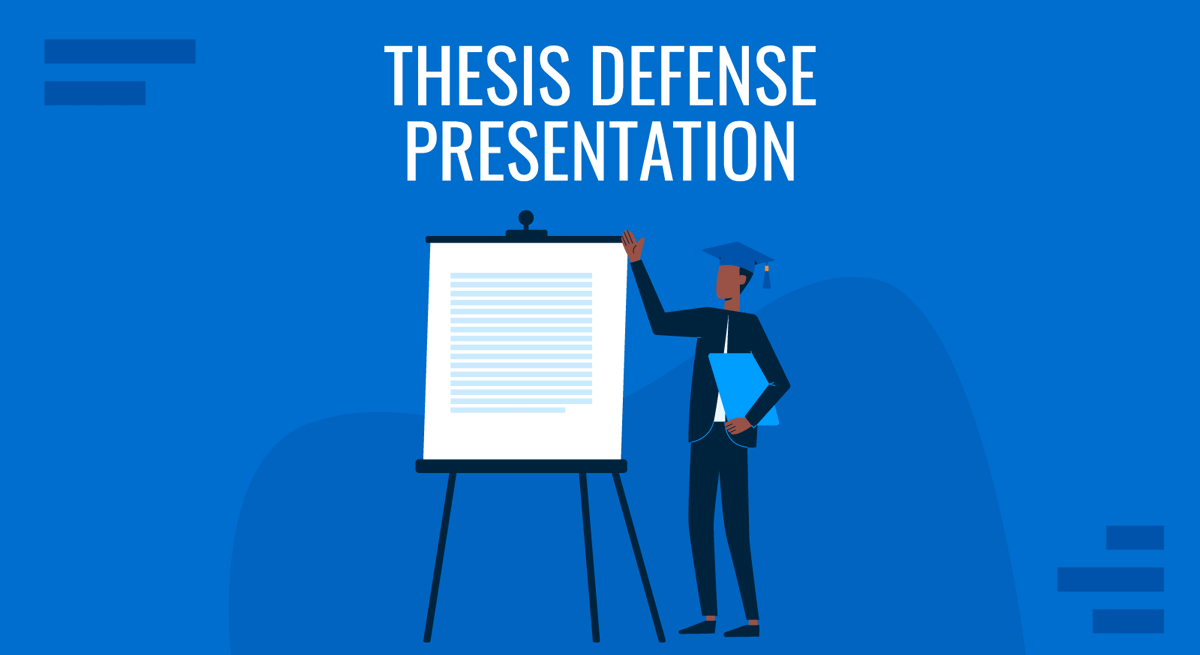
Writing a thesis is stressful, but preparing an oral defense can be even more painful. But it doesn’t have to be; with proper preparation and a good presentation, you will be able to better equip yourself comes time to present your thesis defense.
But what makes a good thesis defense?
A proper presentation helps you with your thesis defense because it helps you capture the panels’ attention and gives you cues and reminders on what to say as well.
It also helps keep your data organized while visually looking good and provides a flow structure for the rest of your presentation.
In today’s article, we will be giving you The Right PowerPoint Templates for Your Thesis Defense and a powerful outline composed of best practices and layouts specifically designed to help you defend your thesis in both written and oral presentations.
In the next segments of this article, we’ll walk you through the most feasible process on how to ace this kind of presentation.
Let’s dive into the outline of what makes a great thesis defense.
Thesis Defense Overview
Similarities.
- Type of Degree
Thesis and Dissertation Distinction Varies on Location
Three most common thesis defense myths, how to use chatgpt to structure your thesis.
- Introduction
- Literature Review
- Methodology
- Acknowledgements
- Questions and Answers
- Contact Information
- Tips During Your Oral Defense
- More Quick Tips on How to Present
A thesis defense is composed of two parts – a thesis and a defense.
The thesis, according to Grad School Hub , represents a student’s collective understanding of his or her program and major.
Universities often include a thesis in every course as one of the final requirements to earn a particular graduate or postgraduate degree.
The thesis, however, isn’t just a mere requirement.
It helps the students to grow out of their shell from their respective discipline and give them the opportunity to present all the findings of their study.
Moreover, some people think a thesis is just a long essay, but it’s not. Unlike an essay, a thesis needs to assert something.
This can be considered one of the most crucial research documents that a student makes during their academic schooling.
On the other hand, defense is the presentation of the pieces of evidence to support and prove your research.
It’s the most essential part of the thesis process.
Your presentation has to be prepared to answer questions from members of the committee and any other panel present, and it’s your job to convince them and defend your thesis with ample proof.
Prior to presenting, you have to carefully determine what appropriate evidence should be presented before the panel, depending on what thesis you have to defend.

Thesis and Dissertation Distinguished
A thesis or dissertation is usually required to complete a particular graduate degree. These two words are often used interchangeably by most students when referring to research studies.
But while being almost similar in format or structure, it’s worth noting that they have significant differences that set them apart from each other.
The very reason why thesis and dissertation are treated the same is that these two are both extensive papers. Not just merely long essays like what others are claiming.
Both of these papers are extensive. This is why students are given ample time, usually the entire last semester of the last year of study, to complete all the requirements and finally acquire their degree.
With regards to structure, both papers are very similar with few differences.
Differences Between Thesis and Dissertation
One of the significant differences between the two is to whom the paper is assigned. A thesis is usually required for those students earning a bachelor’s or master’s degree. While a dissertation is for those, who want to obtain a doctorate degree.
However, not all students taking a master’s degree are required to make a thesis. Prior to their enrollment, they have been given a choice of whether they’ll go for a non-thesis program or with a thesis.
Those who have a plan to escalate their degree to a doctorate eventually should take the path of a thesis. This is to prepare themselves for a more extensive dissertation requirement as doctorate students. Otherwise, they will be only limited to earning a master’s degree.
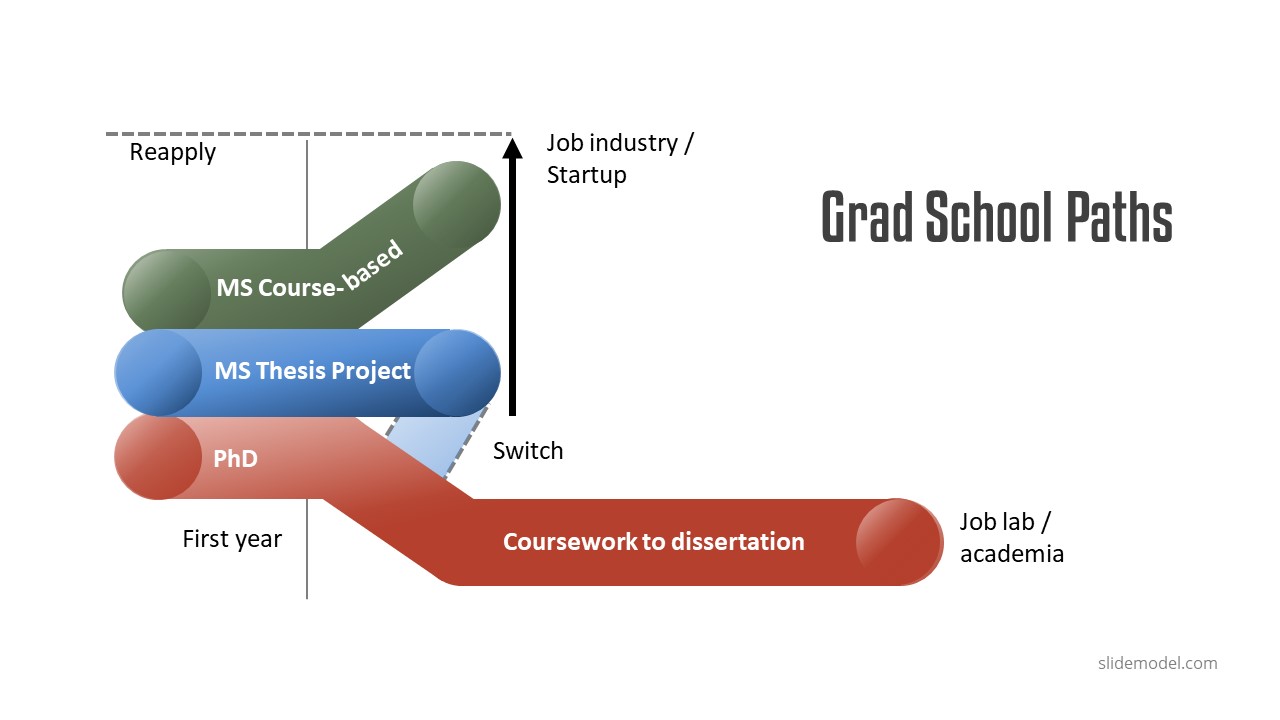
But above all, the most significant difference between the two papers is the purpose for which it is written.
A thesis, like what has been mentioned above, is being done by students obtaining a bachelor’s or master’s degree and has the purpose of testing their understanding of the discipline they’re engaged with.
A thesis is focused on obtaining technical expertise.
On the other hand, a dissertation is made for students to come up with an original study that other researchers haven’t already studied.
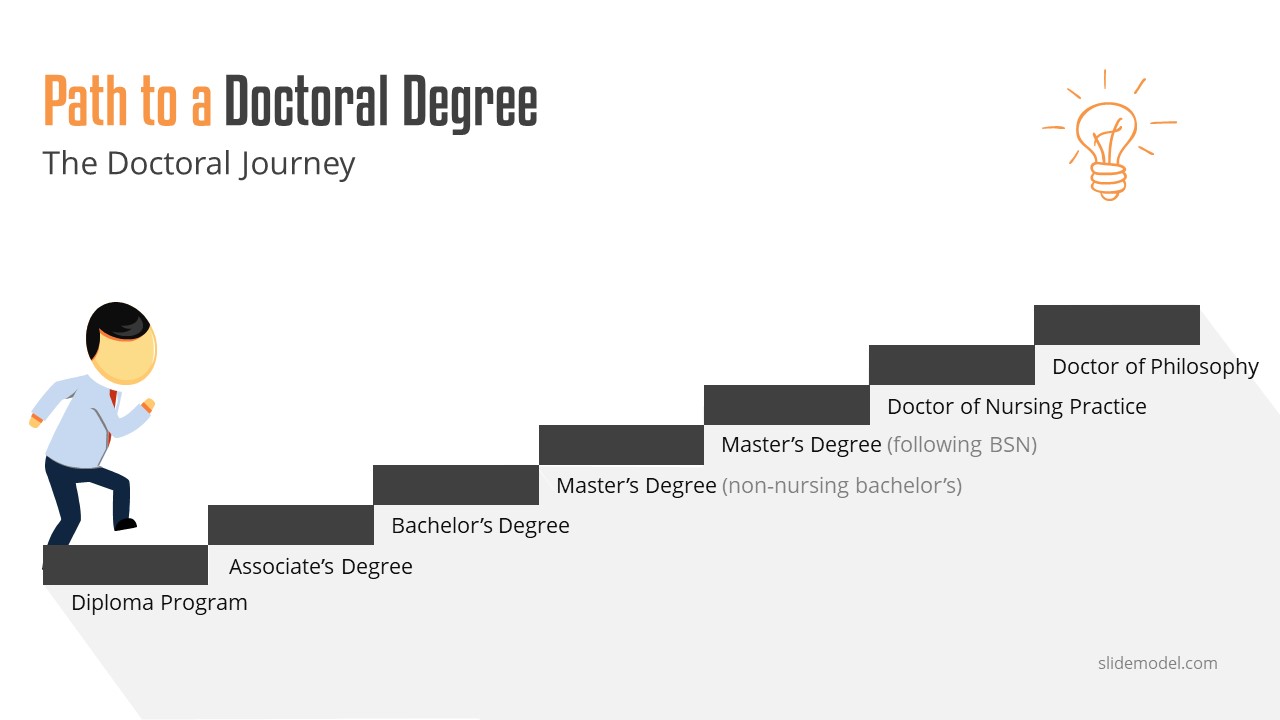
USA: In the United States of America, they consider a thesis shorter than a dissertation. In fact, aside from being a requirement to graduate in college, a thesis is now also inculcated in master’s degree programs. And since the dissertation is more extensive, the thesis is treated as preliminary in gaining a doctorate degree.
Europe: The distinction between the two papers is almost opposite to that of the USA. In Europe, a dissertation is only a broader research study from a post-graduate program and not the making of original research. Instead, educational systems in the said continent treat the doctoral thesis as a more elaborate paper writing.

The difference between a thesis and a dissertation might not seem that big, but it’s important that we know what makes them different.
If your upcoming defense gives you pressure and uneasiness, it could be cause you are not sure what to expect. Today we will dispel three common thesis defense myths that will help you be more confident in your presentation.
“Answer all the questions correctly. Otherwise, your thesis won’t get approved.”
You are expected to have a focus on your research.
That being said, you have to study each part of your thesis, every detail, and even your sources.
You have to study and practice how to effectively deliver your presentation.
But don’t overthink to the extent that you’re stressing yourself to know everything perfectly.
Don’t overstress if you can’t answer one of the questions, this doesn’t necessarily mean the committee won’t approve your thesis.
You should know that research is a continuous study.
So you should expect that your committee will always be able to find a gap in your study to fill in future related research .
So in times you don’t exactly know the answer, admit it, and you’ll learn as they give their sides or suggestions.
Making up an answer will only displease your committee, so it’s to be upfront, honest, and transparent.
“The committee is just there to find holes in your study. They don’t care about you.”
One of the typical descriptions students have of the committee is that they are just there to poke holes in your thesis.
Going in with this perspective makes standing before them a nerve-wracking experience.
They’re not your enemy.
In fact, they are there to help you polish your study.
They might challenge you with difficult suggestions and tricky questions.
In the end, they will walk you through the process to come up with better results that won’t only benefit you but also your research.
They care about you and your study, and they’re ultimately there to make your thesis and the research better. Separate yourself from your work look at it objectively, and don’t take their comments personally .
“If your thesis defense isn’t successful, you have to start your thesis all over again”
An unsuccessful defense is one of the worst-case fears most students have.
One thing that you should be aware of is when you aren’t able to please your committee, you don’t need to start a new thesis again or go back to square one with your existing paper.
It’s unusual that your committee will ask you to change your topic and start from scratch again.
The fact that you’ve been permitted to defend your study means your research is almost complete.
They might suggest further details or ask you for minor revisions, and that’s normal.
But overall, you need to go into this defense thinking that your presentation will be successful. Otherwise, you are already setting yourself up for failure with the wrong mindset.
Remember that positive thoughts attract positive results.
Thesis Defense Presentation Structure and Slides Content
We can use language learning models like ChatGPT to help us curate the structure of our thesis presentation. Let’s see a step-by-step solution on how to apply this.
Step 1: Define the thesis topic and research questions
You can set the environment for ChatGPT to work by explaining what your thesis is going to cover and which specific questions you aim to address through the course of that document. This gives ChatGPT the context from which it shall formulate the structure. A prompt can be written like this:
“Take the role of an academic professional who shall help me to write my thesis. This thesis is going to cover the topic of (insert topic), and through its course, I want to answer these questions: Question 1 – Question 2 – Question 3 – Consider this information as the starting point for this chat.”
Step 2: Ask for an outline
With the previously provided information, ask ChatGPT to generate an outline for your presentation. If some of the points listed in the output don’t convince you, then chat with the interface until you reach a final outline. Then, ask to elaborate on each specific point for information or cues you may have overlooked.
Step 3: Ask ChatGPT which content should you place per slide
Instead of debating how are you going to trim your thesis into a presentation format, ask ChatGPT to do the decision process for you. You can be as specific as asking how many words per slide, how many slides should the presentation have, if you need any visual element, etc.
N.B.: We don’t recommend using ChatGPT to retrieve academic references as, in some cases, it can provide faulty results. You can ask if any facts on this presentation need to be checked or similar questions. ChatGPT is a powerful tool, but it shouldn’t be considered a bible, so be extra cautious about grabbing content directly from its outputs.
1. Title Page
This slide should contain the information that is provided on the title page of your hard copy . Here is an example of title page or cover slide for your title defense or thesis presentation.

- The title of your research paper
- Where you are studying
- Name and details of your course
- Name of Adviser
2. Introduction Slide
Your introduction slide should provide the committee with an idea of the following:
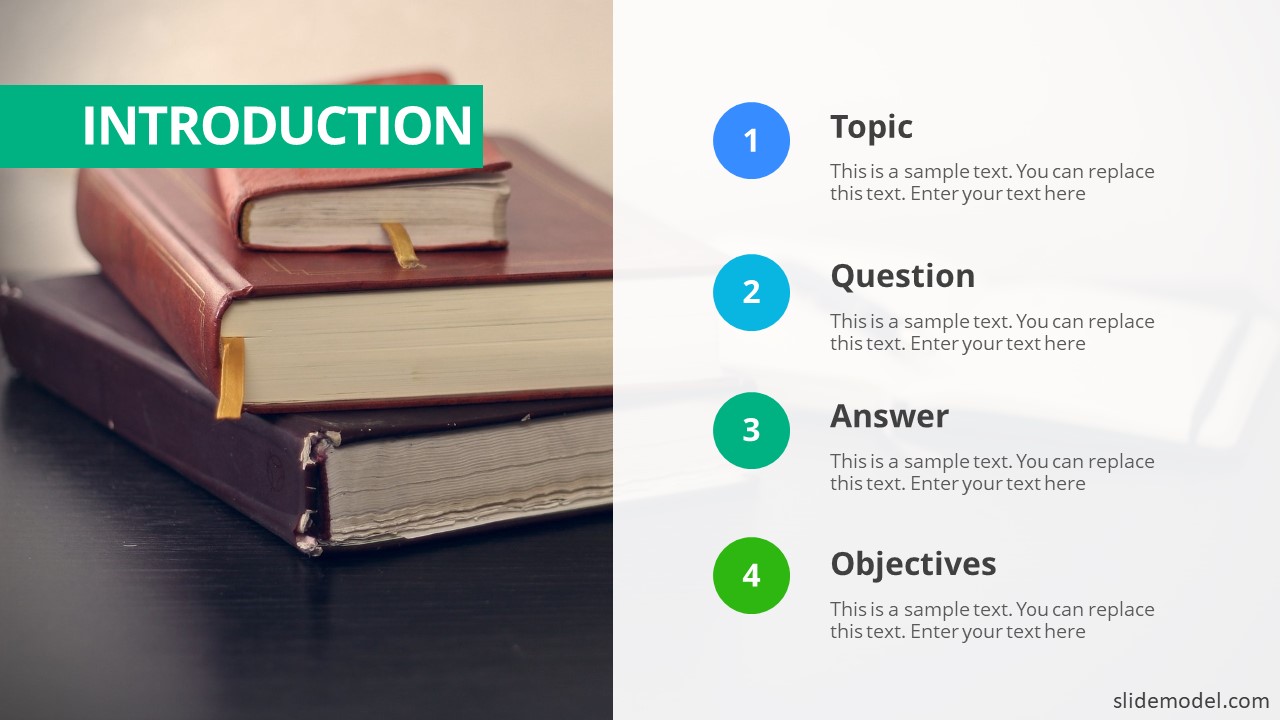
- What is the topic area that you are investigating ?
- What are the specific research questions that you set out to answer?
- Why is this question important to answer?
- What were the objectives of your research?
3. Literature Review Slide
It’s not necessary to cover everything that’s currently understood in the available literature. You may want to present the following content under a Literature Review slide:

- Relevant current research that is close to your topic
- Different theories that may apply to your specific area of research
- Areas of weakness that are currently highlighted
4. Methodology Slide
Make sure to touch the factors below within your process, and include the following in the Methodology slide:
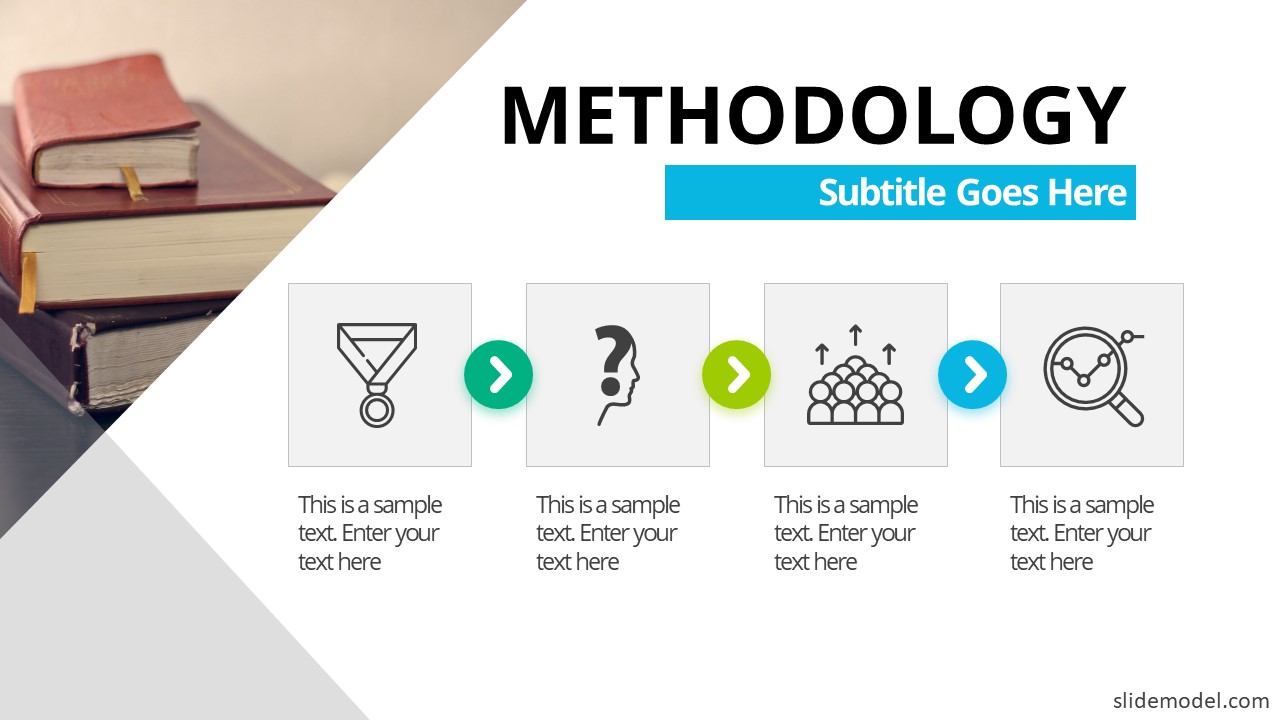
- The type of study you have conducted: qualitative, quantitative, or mixed
- The methods that you chose and why
- Details of the population, sampling methods, and other information
- Provide information regarding how you have analyzed the data that you have collected
5. Results Slide
This part should give the committee/audience a good understanding of what you’ve discovered during your research. The statistics & results slide could include the final results of your analysis, here is an example:

- An overall description of the data that you collected during your research
- The results of the analysis that you have done on that data
- What were the most significant findings from your data
6. Discussion Slide
Highlight here the meaning of the findings in relation to your discipline program and the research that you have done:

- What are the major findings, and what do they mean with regard to your research
- How do these findings relate to what others have found in the past
- How can you explain any unusual or surprising result
7. Conclusions Slide
You have to end your presentation with a conclusion summarizing all that you have found within your research. Here is an example of a Conclusion slide in a Thesis presentation:

- Restate your research questions
- Show how your results answer these questions
- Show what contribution you have made
- State any limitations to the work you have done
- Suggest future research
- Make any recommendations
See Also: How to Create a Great Investors Pitch Deck and Close the Deal
8. Acknowledgements Slide
Express gratitude to your advisor, committee members, peers, and others who supported your research journey. This slide provides a moment to acknowledge the collaborative nature of academic work.
9. Questions and Answers Slide
Dedicate a slide for audience questions at the end of your presentation.
Encourage engagement by inviting questions from the audience.
Be prepared to provide clear and concise responses to inquiries.
10. References Slide
Include a slide listing your cited sources throughout your presentation.
Use a consistent citation style (APA, MLA, Chicago, etc.).
The References slide demonstrates your thorough engagement with existing literature.
11. Contact Information Slide
If you’re open to further inquiries or collaborations, consider adding your contact information.
Include your email address or relevant professional social media handles.
How to use SlideModel AI Presentation Maker for your Thesis Presentation
If you want to save hours of manual time, you can leverage AI tools to make your thesis presentation. The best part of integrating AI tools into our workflow is that we can pair them to get even better results than we expected. With SlideModel’s AI presentation maker , users can create an entire slide deck by introducing these variables:
- Topic of your thesis
- Number of slides to include in your thesis presentation
- Outline checkup
And that’s it! Download the AI-generated presentation in PPTX format or for Google Slides, and edit it if you require adding some extra content. The core elements are already done, and you can save countless hours of hard work.
Tips During Your Oral Defense!
Review your materials.
Even if you already feel confident with your upcoming presentation, you still need to review your materials.
You can bring the hard copy of your thesis with you during the defense, but you don’t want to get lost in your presentation when you forget some specific details and have to scan your papers.
You should know your paper in and out.
Rehearse Your Presentation
It’s not wrong if it sounds like a script when you speak in your oral defense. It’s expected and understandable.
You need to practice your presentation, especially when there’s a time restriction given to every presenter.
You only need to prepare enough slides that would fit your time limit. A hundred slides aren’t suitable for a 15 to 20-minute presentation, nor 10 slides for an hour of defense.
Your rehearsal will be more effective if you practice it in front of an audience.
Note: You will experience complete silence in the defense room. You might feel awkward because, most of the time, you’re the only one speaking out loud. This is completely fine, and it’s something you should practice in rehearsal should you be afraid.
Narrow the Presentation of Ideas
Regarding your slides, you don’t have to include everything that’s in your paper. You should narrow down your ideas to the main points and the most important details, such as the statistics and findings.
If the members of your committee think you lack details or they want to hear a further explanation, they won’t hesitate to ask you.
Prepare for the Unexpected Questions
The panel tends to challenge the presenters, usually through some hard questions.
Its aim is how well do you you have done your research and how prepared you are.
But as long as you know the ins and outs of your paper, you shouldn’t lose your confidence regardless of which questions they ask.
Just keep in mind that what you’re saying in your oral defense is not in conflict with what is written on the hard copy you provided them.
What To Do When You Don’t Know the Answer
If the committee asks you a question and you don’t know the answer, don’t make up a baseless answer.
Baseless means out-of-context answers or something without proof or backup.
How To Deal With The Nervousness
The committee expects you to be nervous. Of course, it’s normal.
However, one effect of being nervous is the changes in your behavior.
There’s a tendency for you’ll talk fast, which will make it hard for the committee to understand you.
It might also cause you to have a mental block.
So try to slow down. Take a deep breath.
Inhale, exhale. Remember to breathe!
It’s OK to pause, and it’s OK to take your time; it’s more important that the committee clearly understands what you are trying to articulate.
More Quick Tips on How to Present!
- Introduce yourself at the beginning
- Introduce the title of the presentation
- Don’t read your notes if possible
- Don’t speak too fast
- Put an emphasis on what you’re saying so you don’t sound monotonous
- Look at your adviser once in a while for possible signs
- Stand on the right of the white screen if you are right-handed so you can easily refer to the slide without giving your back to the committee
- Face the audience when you talk
- Keep an eye contact
- Make sure to keep attention to the reactions of the committee and don’t forget to react in turn
We hope you enjoyed this article on how to do a proper thesis defense and how to best prepare for one using proven tips and techniques to help you get through this. Hopefully, after your defense, you will be set as the one in your class to deliver an inspiring graduation speech for your peers. If you have value, please remember to share this article. We also recommend you read these Thesis Statement Examples for inspiration to create your own professionally.
1. MasterDoc PowerPoint Template

Creating a Thesis presentation should be a straight forward task; based on your thesis document and following the tips described above you have a high level structure already outlined. The MasterDoc PowerPoint template provides professional layouts with texts and image placeholders; so you can create document like slides using your thesis defense as your content. This template is ideal for a highly detailed documents, where visuals and words unite to illustrate one concept per page. The result is an asset that can be read and digested more quickly than either your thesis document or a presentation created for assisting a speech. A document created with the MasterDoc PowerPoint templates is meant to be printed or distributed, read on screen without the accompaniment of a presenter or used in an e-learning platform as pure learning content.
Use This Template
2. Thesis Presentation PowerPoint Template

You had invested a considerable time researching, testing hypothesis and confirming your thesis. Craft your thesis presentation with the same level of detail you applied in your work. Using the Thesis Presentation PowerPoint Template you will focus only in your content and your message. The layouts, images,design and structure will be taken care by the template.
3. Master Thesis PowerPoint Template

The Master Thesis PowerPoint Template is a professional document designed for postgraduate degrees presentations. It provides simple sections that follow the structure and best practices of traditional research thesis presentations. Starting with the introduction to the theory and state of the art scenario; following with hypothesis research and its findings and concluding with the confirmation or negation of the initial thesis statement.

4. Essay Outline PowerPoint Template

Your thesis defense can be accompanied by an essay, that states your thesis and argues about it using several supporting paragraphs. This kind of document is ideal to be an intermediate step between reading assisting to the thesis presentation and reading the complete thesis documentation. It has more information that your thesis defense abstract, but does summarizes the supporting evidence and examples that allows the argument of each idea behind the thesis. You can use the Essay Outline Template to present your Essay outline and create an essay linked to your thesis defense documentation.
Like this article? Please share
Academics, Degree, Dissertation, Doctorate, Education, Faculty, Master, PhD, Student, Thesis Filed under Presentation Ideas
Related Articles

Filed under Education • October 24th, 2024
Thesis Statement Examples
What makes a good thesis statement? Simple answer, precision and enough evidence to support your statement. In this article we analyze what are good thesis statements with examples.
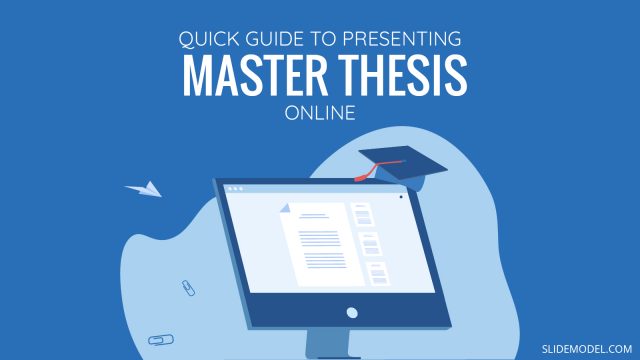
Filed under Education • June 19th, 2024
A Quick Guide to Presenting an Online Master’s Thesis
A Master thesis is one of the most important career times, and can be the make it or break it of years of study. Learn more in this article on how to make it amazing.

Filed under Education • June 4th, 2024
A Quick Guide to Dissertation Writing
This articles provides a summarized guide answering the main questions professionals have when writing their dissertation. You will learn the basic structure and its content. You can download assets for your dissertation presentation.
36 Responses to “How To Do a Proper Thesis Defense Using the Right PowerPoint Presentation”
Great job! This has made my thesis presentation a whole lot easier.
Excellent !!!!!
Now I feel I’m quite confident on how to do my dissertation presentation properly and how to defend it. I will share that with other friends and colleagues.
Thank you so much for your kind help.
Best regards, Awad
Thank you for such a valuable guide.
it was very helpful
Thanks a bunch for the general summary for thesis defense with all related information that we might have to know. Great job!
Great tips.
i have proposal defense in two days and im so nervous right now! reading this is helpful in some ways thankyou!
It’s very helpful and understandable. Easy steps to follow.
I found it very helpful to refresh and make my self ready for my defense!
Thank you a lot this article. It’s really helpful!
Naveen Kumar S: Thank you its very Helpful. I appreciate all your effort this is very useful.
Very important and interesting so go on thank you
I really like it. In the near future I am going to present for the MA thesis. Therefore, it will guide me a lot. If you can please attach with this email the detail.
I do like the article as it proves to be valuable and worthy. I enjoyed reading every single note. It helped me feel at ease and have confidence when my viva day takes place. THANK YOU SO MUCH.
Appreciate your Assistance
Thanks a lot for the gist
Thank you so much, I got full information and knowledge.
This has made me look forward to my thesis defense. Thanks a lot
Very useful
thank you very much for your best information
Thank you very much the article is full of knowledge on Thesis as well as dissertation defense. Big Up!
I am appreciative. Well informative and educative.
Thanks immensely for these wonderful tips on presentation during defense. I personally found more useful to me as I prepare to defend my Master Dissertation.
Thank you very much! I now feel more confident.
Thanks for your good self overall usability of the Participations motivated points and contribute significantly in thesis defense practices. Best wishes to one and All
Happy To Help.
Thank you very much. As I am pursuing for my PhD in Leadership, I got it so meaningful and worth having.
Your tips on What a Thesis and Dissertation are, are on point. I have fully understood their differences and similarities. I have also noted the killer way of summaring a Power Point Presentation. Slidemodel.com…you are just a force to reckon with. I need more information…in case you have models you can share with me and those interested in this subject covered.
Thanks a million times for your timely guidance. Just preparing to do my PhD Thesis defense.
this was very, very helpful…Thank you!
Highly appreciate your effort to deliver what a student is looking for. I find your article really helpful and to the point. Thanks !
Regarding to my P.P, I’ve understood so many issues from this. Thankyou!
i got it as it is so important for my deffence presentation, thanky you very much
This Material was very hopeful and encourage any student who prepare any presentation relation with thesis. It also combined more encauragable and it enhance presentation!
Thought provoking content Thank you.
Great comments. very helpful
Leave a Reply

The 10 Key Components of a Successful Thesis Defence Presentation
Sep 27, 2023 | Research FAQs
What are the Key Components of a Successful Thesis Defence Presentation?
The culmination of years of rigorous research, analysis, and academic dedication is often encapsulated in a single event – a successful thesis defence presentation. This pivotal moment in an academic journey can be both exhilarating and nerve-wracking. Success hinges on a well-prepared and effectively delivered presentation. In this comprehensive guide, we will delve into the key components of a successful thesis defence presentation, equipping you with the knowledge and insights necessary to navigate this critical milestone in your academic career.
10 Key Strategies To Defend Your Thesis
#1 clearly define your statement of thesis.
At the heart of every successful thesis defence presentation lies a well-articulated statement of thesis. This concise and focused sentence or two should encapsulate the core question or problem your research addresses. Peer review, a critical evaluation of your work by experts in the field, often commences with a thorough assessment of the clarity and relevance of your thesis statement. It is the compass that guides your entire presentation.

The statement of thesis serves as the cornerstone of an entire successful thesis defence presentation, and its importance cannot be overstated. This concise and focused sentence or two should encapsulate the core question or problem your research addresses. Think of it as the spark that ignites the intellectual journey you’re about to take your audience on.
When you consider the peer review process, it becomes clear that the experts in your field are like seasoned explorers, setting out on an intellectual expedition through your work. And where does their journey begin? With your thesis statement. It acts as the compass that guides their critical evaluation. They venture into the depths of your research, often commencing with a meticulous assessment of the clarity and relevance of your thesis statement. It’s not merely a formality; it’s a critical checkpoint to ensure that your compass is finely tuned and aligned with the path you’ve forged.
#2 Comprehensive Literature Review
A robust literature review demonstrates your understanding of the existing body of knowledge in your field. This component of your presentation should not merely summarise relevant literature but critically analyse it. Peer-reviewed journals, academic databases, and scholarly publications are invaluable resources for conducting a thorough literature review. Clearly demonstrate how your research fits into the existing landscape and adds a new dimension to the field.
Your literature review isn’t just a bibliography; it’s the evidence of your mastery over the existing body of knowledge in your field. It should be robust, showcasing your understanding and critical thinking abilities. Think of it as a treasure trove of insights from the minds of scholars who have paved the way before you.
Peer-reviewed journals, academic databases, and scholarly publications are the maps to this treasure trove. They are invaluable resources for conducting a thorough literature review. But remember, your role is not merely that of a summariser; you are an interpreter. Your presentation should not merely summarise relevant literature but critically analyse it. Imagine yourself as an art critic, dissecting each brushstroke to reveal the masterpiece that is your research. Show the audience how your research fits into the existing landscape and adds a new dimension to the field, like an artist contributing a unique piece to a gallery.
#3 Methodology and Data Collection
Describe in detail the methodologies employed in your research, addressing questions such as: How did you collect data? What tools or instruments did you use? How did you ensure the validity and reliability of your data? Peer review often scrutinises the rigor of your research methods, so be prepared to defend your choices and demonstrate their appropriateness for your study.
Your methodology is the blueprint of your research, and the data you collect are the bricks that build your thesis. This section deserves meticulous attention and clarity. Describe in detail the methodologies employed in your research. Address questions such as: How did you collect data? What tools or instruments did you use? How did you ensure the validity and reliability of your data? Think of it as the architectural plans that ensure your thesis stands tall and sturdy.
Keep in mind that peer review often scrutinises the rigor of your research methods. It’s like having a team of experienced builders inspecting your construction site for structural integrity. Be prepared to defend your choices and demonstrate their appropriateness for your study. You’re not just presenting data; you’re presenting the process behind the creation of your data.
#4 Data Analysis and Results
Present your findings with precision and clarity. Utilise graphs, tables, and visuals to enhance comprehension. Peer review experts will closely examine your data analysis methods to ensure they are statistically sound. Transparency in reporting results, including any limitations or unexpected outcomes, is crucial. Remember, transparency fosters credibility.
Your data is the treasure you’ve unearthed through your research, and it’s time to present it with precision and clarity. Visual aids like graphs, tables, and visuals should be your artistic tools. Imagine yourself as a storyteller, weaving a narrative with data points.

Peer review experts will closely examine your data analysis methods to ensure they are statistically sound. It’s akin to having statisticians double-check your calculations. Transparency in reporting results is paramount. Think of it as being transparent about the ingredients of a recipe; it fosters credibility. Be honest about any limitations or unexpected outcomes, just as a chef might explain a dish’s unique flavours. Transparency invites trust and understanding.
#5 Discussion and Interpretation
This is your opportunity to showcase your critical thinking skills. Discuss the implications of your findings in the context of your thesis statement and existing literature. Address any unanswered questions or areas for future research. Peer review experts will assess the depth of your analysis and the coherence of your interpretations.
This is the moment when your audience gets a glimpse of your critical thinking skills. It’s not just about presenting data; it’s about the story behind the data. Consider yourself a detective solving a complex mystery. Discuss the implications of your findings in the context of your thesis statement and existing literature.
Address any unanswered questions or areas for future research. This is your chance to engage your audience in a scholarly conversation. Peer review experts will assess the depth of your analysis and the coherence of your interpretations. Think of it as a roundtable discussion where your ideas are put to the test.
#6 Effective Presentation Skills
Engage your audience with effective presentation skills. Practice your delivery, ensuring that you maintain eye contact, speak clearly, and use appropriate gestures. A confident and composed demeanour goes a long way in conveying your expertise. Utilise visual aids sparingly and strategically to enhance, not overwhelm, your presentation.
As you step into the spotlight of your thesis defence presentation, imagine yourself as a performer on the academic stage. Engage your audience with effective presentation skills that not only convey your expertise but also hold their attention. Practice your delivery meticulously to ensure that you maintain eye contact, speak clearly, and use appropriate gestures.
Confidence is your best companion on this stage. A confident and composed demeanour goes a long way in conveying your mastery of the subject matter. Utilise visual aids sparingly and strategically to enhance, not overwhelm, your presentation. Think of them as props in a play, designed to complement your narrative, not steal the show.
#7 Anticipate and Address Questions
Be prepared for a barrage of questions from the thesis committee during and after your presentation. Anticipate potential queries based on your research and be ready to provide well-informed responses. Peer review often extends to this phase, assessing your ability to defend your research and engage in scholarly discourse.
The Q&A session during and after your presentation is a challenging yet essential phase. Imagine it as the part of your performance where the audience gets to interact with you directly. Be prepared for a barrage of questions from the thesis committee. Anticipate potential queries based on your research and be ready to provide well-informed responses.
Peer review often extends to this phase, assessing your ability to defend your research and engage in scholarly discourse. Think of it as a debate where you defend your thesis against the toughest opponents. Embrace questions as opportunities to showcase your expertise and deepen the understanding of your work.
#8 Time Management
Respect the allocated time for your presentation. Going over your time limit can be detrimental and reflects poorly on your preparation. Time management is a skill that not only demonstrates professionalism but also allows for a smoother and more focused presentation.
Time management is the conductor’s baton in the symphony of your presentation. It’s not just about keeping things on schedule; it’s about ensuring that your performance is harmonious and well-paced. Respect the allocated time for your presentation. Going over your time limit can be detrimental and reflects poorly on your preparation.
Think of your presentation as a well-rehearsed orchestral piece, with each section seamlessly flowing into the next. Time management is the key to orchestrating this performance effectively. It demonstrates professionalism and allows for a smoother and more focused presentation.

#9 Adaptability
Be ready to adapt to unforeseen circumstances or questions. Your ability to handle unexpected challenges with grace and knowledge can leave a positive impression on both your thesis committee and peer reviewers.
In the world of academia, as in life, surprises are inevitable. Be ready to adapt to unforeseen circumstances or questions. Your ability to handle unexpected challenges with grace and knowledge can leave a lasting positive impression on both your thesis committee and peer reviewers.
Think of this adaptability as the mark of a seasoned explorer who can navigate uncharted territory. The ability to pivot gracefully when faced with the unexpected demonstrates your resilience and expertise.
#10 Mock Defences and Feedback
Prior to your actual defence, conduct mock thesis defence presentations with peers or mentors. Seek constructive feedback to refine your presentation. This rehearsal process can help you identify areas that may require improvement and boost your confidence.
Before the curtain rises on your actual defence, consider the value of dress rehearsals in the world of theatre. Prior to your defence, conduct mock thesis defence presentations with peers or mentors. Seek constructive feedback to refine your presentation. This rehearsal process can help you identify areas that may require improvement and boost your confidence.
Think of these mock defences as a preview performance, an opportunity to fine-tune your act before the main event. Constructive feedback from trusted sources is like the guidance of seasoned directors, helping you polish your performance and ensure you’re ready for the spotlight.
In conclusion, a successful thesis defence presentation is a multifaceted performance that combines research expertise, effective communication, and adaptability. Each component plays a crucial role in shaping the narrative of your research journey. Just as a skilled performer prepares meticulously for a show, you too must invest time and effort in honing your skills and refining your presentation. Embrace the peer review process as a means to elevate your work and ensure it stands up to the scrutiny of the academic community. With these key components and a commitment to excellence, you’ll not only defend your thesis but also make a meaningful contribution to your field of study.
Key Tips To A Successful Thesis Defence
- Clear and Concise Thesis Statement : Craft a thesis statement that is clear, concise, and aligned with your research.
- Thorough Literature Review : Leave no stone unturned in your literature review to demonstrate your grasp of existing knowledge.
- Prepare for Questions : Anticipate questions and practice your responses to showcase your expertise.
- Practice and Timing : Practice your presentation and stick to the allotted time.
- Adaptability and Confidence : Stay adaptable and confident in the face of unexpected challenges.
The Building Blocks of a Successful Thesis Defence Presentation
In the realm of academia, the successful thesis defence presentation is a culmination of years of dedication, research, and scholarship. It is a testament to your expertise in your chosen field and your ability to contribute to the body of knowledge. Key components, such as a well-defined thesis statement, a comprehensive literature review, meticulous data analysis, and effective presentation skills, are the building blocks of a successful presentation.
Moreover, the engagement with peer review processes adds a layer of scrutiny that enhances the quality and credibility of your work. Embrace feedback, both during mock defences and from the thesis committee, as opportunities for growth and refinement.
As you embark on this academic journey, remember that a successful thesis defence presentation is not just a milestone but a stepping stone to a future where your research can make a significant impact. The key to success lies in meticulous preparation, effective communication, and a deep passion for your subject matter. With these components in place, you are well on your way to a successful thesis defence.
Useful Resources
Way With Words – Website: https://waywithwords.net/services/transcription-services . A reliable source for academic research transcription services, ensuring accuracy and professionalism in transcribing your research data.
Peer Review Process – Website: https://www.elsevier.com/reviewers/what-is-peer-review . Understand the peer review process and its significance in academic research.
Engagement Questions
As you prepare for a successful thesis defence, ask yourself:
- How can I best convey the significance of my research to both my thesis committee and the broader academic community?
- How can I use peer review feedback to strengthen my work?
- What are the key takeaways from my research that I want my audience to remember?
Remember that a successful thesis defence is not just about defending your research; it’s about sharing your passion and contributing to the academic discourse in your field. Embrace the journey, and you’ll emerge from it with a deeper understanding of your subject and a sense of accomplishment that comes from mastering this critical academic milestone.

How to Effectively Prepare for Your Thesis Defense

You’ve completed your research study, written your thesis, and think you’re done! If only it were this easy. Before you finish with your thesis, there is one last hurdle to overcome: the thesis defense.
What is a thesis defense?
A thesis defense is an opportunity for you to present your research study before other academic professionals who will evaluate the quality of your academic work. While a thesis defense can sometimes feel like a cross-examination in a court of law, in reality, there is no need to fear your thesis defense as long as you are well-prepared. In this article, we’ll talk about how to prepare for a thesis defense, what to expect at the defense itself, and what comes after your defense.
Why do I have to defend my thesis?
At your thesis defense, you will discuss everything you’ve learned with a group of interested examiners who are eager to hear your thoughts.
The fundamental purpose of a thesis defense is to prove that you have mastered your subject and can be considered as a knowledgeable expert in your field, thereby allowing you to graduate successfully. For many students, a thesis is one of the first attempts at conducting original research and demonstrating that you are equipped to function as an independent expert in your field. If qualified academic professionals can assess your work, question your methods and results, and confirm that your study is sound and novel, then you meet the requirements.
The exact format and expectations for your thesis defense will differ depending on the region you study in and your institution’s rules for the thesis program. The thesis defense meeting may have just two or three examiners or may have a whole panel of examiners along with an audience.
If the thought of facing your professors, peers, and parents to present your research study makes you feel dizzy, you aren’t alone . Moreover, a thesis defense is a great opportunity for you to hone your public speaking skills as well as talk about your research study. At your thesis defense, you will discuss everything you’ve learned with a group of interested examiners who are eager to hear your thoughts.
While the format for a thesis defense will vary, as mentioned above, most thesis defenses consist of:
- Presenting your research study (using PowerPoint or other similar tools)
- Answering questions from your thesis committee
- Receiving feedback from your thesis committee
So how can you prepare for it? Let’s talk about some important tips.
Preparing: Before the defense
It is useful to attend multiple defenses and ask others who have gone through the process what it was like.
The best way to prepare for a thesis defense is to attend other defenses at your institution so that you know what to expect. It is useful to attend multiple defenses and ask others who have gone through the process what it was like. Senior students are often happy to provide advice and can give you specific insights about particular examiners as well as details of the administrative process at your institution.
You should also talk to your thesis advisor well in advance of your defense about what to expect. Ask whether you need to shortlist your own committee, how long your presentation should be, and how long the thesis defense will be. The duration of a thesis defense varies by the degree level as well as the institution. On average, expect your defense to be at least an hour long, possibly longer for a Ph.D.
What should my presentation cover and how can I prepare it?
While preparing your presentation, also prepare a list of questions and answers that you think are likely to be asked by your committee.
You will need to prepare a presentation that will cover the details of your research study. It is wise to rehearse this presentation multiple times in advance of your thesis defense so that you will be comfortable when you actually present in front of your audience. While preparing your presentation, also prepare a list of questions and answers that you think are likely to be asked by your committee. If you can, enlist the help of a classmate or friend to be the examiner. They can ask you questions about your research study so you will be able to practice addressing these questions.
One mistake many students make is assuming that all members of their defense committee will thoroughly read their thesis prior to the defense. This is simply not always the case. For this reason, you should make sure your presentation makes sense to someone who has not actually read your thesis. A typical thesis defense presentation gives:
- An introduction to the topic
- Explains how the study is significant in the field
- Covers the main highlights of the methodology and results of the study
- Picks out the main points from the discussion and conclusion
What should I do the day before my defense?
Before your thesis defense, make sure you have backups of everything you need saved in multiple formats and multiple locations.
Before your thesis defense, make sure you have backups of everything you need to be saved in multiple formats and multiple locations. Put your presentation and your thesis on a USB drive, email it to yourself, upload it to the cloud, and print it out. Leave nothing to chance: you want to be absolutely prepared to defend your thesis short of an act of God obliterating the venue. In addition, make sure you prepare hard copies (printouts) of both your thesis and slideshow for the committee members. It need not be professionally bound at this stage, but they will appreciate having reference material on hand.
Finally, there are some practical steps to take in preparation for the thesis defense. Choose your outfit in advance (you should dress professionally) and practice presenting in it. You should also make sure you know the exact location of the thesis defense venue. Scope out the venue before your defense, if possible, so you can imagine yourself there while you rehearse. If you are presenting virtually, test all your equipment in advance and have a backup plan in case your internet goes out or your computer suddenly crashes. Most importantly, make sure that you eat well and get proper rest the night before. Don’t stay up late rehearsing last minute in the hopes of improving your chances of passing your defense. You will do much better if you are well-rested and alert.
Time to shine: At the defense
Try to stay calm and remember you are not on trial!
What can you expect on the day of the defense?
Typically, you will enter the room, set up, and begin your presentation once the committee indicates that they are ready. As mentioned above, it is always advisable to bring hard copies of both your thesis and slideshow for the committee. That way, they can easily refer to what you are talking about as you present. Make sure you also bring a pencil and notebook with you to take notes, and some water, because you will get thirsty as you talk.
After you are done with the presentation, the committee members will ask questions. Try to stay calm and remember you are not on trial! Your committee generally wants you to succeed, but they also want you to prove that you really know what you’re talking about. Do your best to answer their questions and never be afraid to admit when you don’t know something. It is much better, to be honest than to be caught lying or making something up during your thesis defense.
After the question and answer session, depending on your institution, you may be asked to leave the room while the committee deliberates. You may also be present while they discuss the merits of your defense and make suggestions for how to revise it. Alternatively, they might adjourn to another room if there is a large audience present. After they deliberate, they will usually thank you for your time, and your defense will be over. At some institutions, they will inform you if you passed right away, while at others, you will find out after a few days.
How does my committee decide if my work is good or not?
In general, you can expect your thesis defense and your thesis as a whole to be evaluated based on the below criteria:
- Whether the thesis meets the departmental requirements
- Whether the research study is logical and clear
- Whether the stated objectives are met in the study
- Use of primary and secondary literature
- Use of relevant and up-to-date sources
- Methodological rigor
- Your ability to critically analyze data, facts, relevant literature, and synthesize information into a coherent narrative
- Writing quality and flow
- The validity of your conclusions based on your data and analysis
- The relevance and importance of your research study in the field
- Your ability to clearly and coherently present what your thesis is about
- Your ability to answer questions about your work accurately and in-depth
- Your ability to acknowledge and consider other theories or perspectives and explain why you dismissed one theory in favor of another
In summary, the examining committee want to know:
- Did you meet the thesis criteria set by your institution?
- Did you perform high-quality research work?
- Do you know what you are talking about?
After the defense: What’s next?
After your thesis is approved, you will need to have it professionally bound and then submit copies to your university.
After your thesis defense, you should definitely celebrate and congratulate yourself for all your hard work! Unfortunately, you aren’t quite done yet. Although the committee may notify you about passing, it is also very likely that you will be asked to make some changes to your thesis before you are finally done. You should work with your advisor to finalize and incorporate any comments you received into your work as quickly as possible.
After your thesis is approved, you will need to have it professionally bound and then submit copies to your university. You will also get the chance to order copies for yourself. This process also differs by institution, so make sure you talk to the administration department to figure out what you need to do and when to complete this process.
All in all, while a thesis defense is a scary and overwhelming event, it is also an incredible achievement. Earning your degree is no small feat, and you should definitely feel proud of yourself once you have done it! Check out our site for more tips on how to write a good thesis, where to find the best thesis editing services , and more about thesis editing and proofreading services .
Editor’s pick
Get free updates.
Subscribe to our newsletter for regular insights from the research and publishing industry!
Review Checklist
To prepare for your thesis defense, make sure that you:
Find out your institutional requirements
Talk to your advisor well in advance about what to expect and prepare
Attend defenses of other students to see what they are like
Prepare your presentation early so you can rehearse it
Rehearse your presentation with a timer
Make a list of questions and answers about your research study
Enlist a friend to be the examiner and ask you questions
Prepare multiple backups of your materials (USB drive, Google Drive/Cloud storage, email, hard copy)
Have a plan for computer/internet problems if you are presenting virtually
Eat well and get a good night’s rest before the defense
Arrive at the defense venue early enough to test any IT equipment or internet connection
What should I do to prepare for my thesis defense? +
- Find out your institution’s requirements
- Attend other thesis defenses
- Speak to your advisor
- Prepare and practice your presentation
- Enlist a friend or classmate to act as the examiner and ask you questions while you practice
How long is a typical thesis defense? +
Every institution is different, but most thesis defenses are at least an hour long.
What should my thesis presentation actually contain? +
A typical thesis defense presentation introduces the thesis topic, explains how your study is significant in the field, and covers the main highlights of the methodology and results of the study. It finally picks out the main points from the discussion and conclusion section of your thesis.
What if I fail my thesis defense? +
The odds that you will fail are extremely low! Most advisors and committees do not let a candidate schedule a defense unless they feel the candidate is ready. So, don’t worry about it. However, if you do fail for some reason, your institution will have a process for you to apply to try again.
- Have your assignments done by seasoned writers. 24/7
- Contact us:
- +1 (213) 221-0069
- [email protected]

Thesis Defense Steps: Full Guide How to Prepare and Present

How To Prepare For Your Thesis Defense
If you are conducting post-graduate research within your discipline, you will come across the phrase “thesis defense”. A thesis defense is part of the things you will need to accomplish before acquiring a postgraduate degree.
The thesis defense comes at the end of the graduate program. It is used to determine or define your education milestones while in the university. For this, you need a thesis defense comprehensive guide to be outstanding.

You should do a thesis defense after you have completed the coursework and attended practicum or internship programs.
People Also Read: Thesis vs Hypothesis vs Theory: the Differences and examples
How Long Does a Thesis Defense Take?
On average, a thesis defense takes somewhere between 30 minutes and one hour. However, the time it takes to do a thesis defense depends on the academic level you are in.
While there is no standard or general length for a thesis defense, post-graduate sessions will take longer compared to undergraduate sessions.
Yes, some institutions, professors, or disciplines may require you to do a thesis defense at your undergraduate level. However, the length of the presentation depends on your academic level.
What is the Thesis Defense?

A thesis defense is an act of presenting your academic work to a panel or committee of professors and other involved scholars. From this, they can gauge or grade your abilities in presenting your work.
The arguments presented during the thesis defense are to ascertain that you have understood the course and your selected topic.
You will have to first hand in your work or paper to the professor for grading. Thereafter, you will be summoned for thesis defense.
When summoned for a thesis defense, you will be required to answer all the questions presented to you by the panel of professors. After this, you will be required to leave the room. The panel is to decide whether your paper or thesis is ready for publication. In addition, the panel checks whether your work needs corrections.
In other words, a thesis defense is a forum that allows postgraduate students to defend the topic of their thesis before a panel of professors. Therefore, the thesis defense is part of the requirements that postgraduate students must accomplish to receive advanced degrees in whichever academic disciplines they pursue.
People Also Read: Subtopic in a Research Paper: How to Write Subtopics Well
Factors that Determine the Length of a Thesis Defense
Just like a dissertation you have to write a thesis, you must have to present it. The time taken to do this varies. The following four factors determine the length of a thesis defense

- As noted earlier, the level of education will determine the length of your thesis defense.
- The second factor is the institutional requirements. Some institutions will have a specified amount of time allocated for a thesis defense. In some institutions, that time is longer than and vice versa.
Very recognized institutions of higher learning will have the autonomy to decide on the length of a thesis defense.
- The third factor that will determine the length of a thesis defense is the consensus of the panel of professors. Some will give students very limited time to do a thesis defense while others will give more time to their students.
Some institutions, and scholars, applaud limiting the amount of time for thesis defense and educators because it gauges the student’s ability to accurately defend their work within a short time. If they succeed, then they are good learners.
- Another factor determining the time of a thesis defense is the academic discipline that is explored by the topic.
While every academic discipline deserves respect, they are not the same in terms of the complexity of the concepts and what the student covers.
Some disciplines will require students to come up with much longer papers. This means that the time it could take to do a thesis defense will be longer.
From the aforementioned factors, it is evident that it would be difficult to predetermine the standard length of a thesis without holding some parameters or factors constant such as the academic level of the thesis.
Also, the length of your dissertation or thesis determines the time you will take to present it at your defense session. Longer documents will take you longer to defend.
People Also Read: Can you Quote Essay Titles: How to use Quotes as Paper Titles
How to Defend a Thesis – 5 Comprehensive Steps
Some steps can help you defend your thesis effectively. You should follow the steps below if you are summoned by a panel of professors to defend your thesis.
1. Adequate Preparation

When you are required to defend your thesis, you will be given a specific date you will appear before the panel of professors for the actual exercise.
As long as you have submitted your paper to the professor for grading, you should always be aware that you will have to defend your thesis.
Therefore, between the period of submitting your paper and the date provided for thesis defense, you should do adequate preparation.
Students will have several months to prepare for a thesis defense. This is because the institutions themselves want their students to be well-prepared before they meet the panel of professors.
After all, they would wish their students to excel in their studies. As noted, there will be a specified date for the thesis defense. Therefore, it will not surprise their committee members or students when the time comes to defend the thesis.
Adequate preparation entails knowing or rather anticipating what is required of you. You should be prepared for the kinds of questions your thesis topic will provoke from the panel and practice on them.
When you have the right attitude and have adequately prepared for the thesis defense, it will be nearly impossible to fail. Also, be prepared to wear decently during the defense.
2. Carry an In-Depth Knowledge of the Thesis
This is a very important step when defending your thesis. Since you are the one who has written the paper, you should be fully aware of the topic and the contents of your paper. What this means is that you should adequately research the topic of your thesis so that you can be ready for any question you are asked by the panel of professors.
For a postgraduate student who wishes to master their discipline, it would be a shame if you do not know about your topic.
For example, if you are within the field of environmental sciences and have written your paper based on the discipline, you should narrow down the scope of your knowledge to that of your topic, the topic of your paper should act as the guide to the amount of knowledge you are supposed to give for the sake of the thesis defense.
Avoid too much knowledge because it may overwhelm you. At the same time, do not narrow down the scope of your topic too much because you will have limited knowledge during the thesis defense.
Your instructor or professor can help you in terms of giving you direction on the type and scope of knowledge you are required to have during a thesis defense.
3. Prepare an Introduction

Have you ever heard of the first impression and its significance?
The first impression of a person will determine how the other person will perceive them.
If it is terrible, the other person may consider them a terrible person and even dislike them.
An introduction plays the same role as the “first impression” of your thesis defense to the panel of professors.
You should prepare a good introduction that summarizes the contents of your paper, the reasons why you selected the topic and its relevance to the discipline, and any other detail that you anticipate to be asked during the thesis defense.
Make sure that the thesis is crystal clear and concise to avoid making any contradictions in your topic and confusing the panel.
Since you will be given several months to prepare for your thesis defense, take time to refine your introduction.
Make adjustments or corrections whenever necessary so that you will have a perfect introduction for your thesis defense. You may recite the introduction or carry it with you if the panel will allow it.
4. Making the Actual Presentation
The action presentation of the thesis defense is quite scary to many students. This is because you will have to face a panel of professors to defend your paper. Based on your paper’s content, you will answer several questions.
Therefore, if you fail during the actual presentation, your paper may not be published and you will have to do further revisions.
During the actual presentation, you should be well dressed because grooming tells a lot about the character of a student. Carry the necessary equipment you will require during the presentation. Such equipment can include a laptop that contains a PowerPoint presentation, a pen, and a notebook.
The PowerPoint presentation should be legible, objective, and strategically written to maximize the time used to defend your thesis. Ensure that you arrive early to the place where you will face the panel of professors to give you time to reflect and lessen your anxiety.
As aforementioned, adequate preparation, an understanding of your topic or thesis, and a good attitude will guarantee success. Therefore, if you adhere to the aforementioned guidelines during the presentation, there is a high probability that your paper will be published.
5. Do a Good Conclusion
Doing a good introduction and effectively presenting your defense is not enough without an equally good conclusion. Just like you took a good time to write your thesis , you will also need a good time to write a presentation and a good conclusion.
A good conclusion of your presentation leaves the panel of professors with a good impression of you and your overall ability to defend your work within the academic community.
A good conclusion will sum up your work. What this means is that you should include a summary of the topic’s background, the literature review, the methodologies, the findings, and the discussions. Make sure that the conclusion compresses the details of your paper logically. It should be brief and straight to the point.
Finally, the conclusion of your thesis defense should clearly describe the limitations or setbacks encountered while you were conducting the study.
Even though you are trying to show that you are a good post-graduate student, it is important to be clear about the limitations. This will demonstrate your academic integrity and ability to conduct actual research in the field.
People Also Read: Essay Reading: Practice and Importance of Reading Essays
Tips on How to Do a Good Thesis Defense

1. Anticipate the Questions
As aforementioned, you should anticipate the questions you may be asked by the panel and prepare for them.
The question base is on your thesis. As such, you should go through your paper and list the possible questions.
At the same time, the academic expertise of the committee members determines the types of questions you may be asked.
Try to have an informed idea, based on your paper, on the areas to receive much focus.
2. Dress for Success
Do you remember that we have talked about first impressions? Well, your dress code and overall grooming will have a degree of impact on the outcomes of your presentation. Dress well.
Mostly, you are required to dress in official attire because you are going to do a presentation to a panel of academic experts. You should try as much as possible not to wear casual or provocative clothes.
3. Delegate
To avoid being overwhelmed during the day of your presentation, you can delegate some of the less complicated activities to a trusted person or friend.
The activities that you can delegate include setting up the equipment you will use for your presentation or distributing handouts to the panel.
4. Create a Backup Plan
This especially involves the mode of presenting your defense. Since you will be using your laptop and a projector, they may fail during the presentation. It is therefore important to have a plan B. Such can include having printed handouts.
People Also Read: Conclusion Starters: What they are and Examples for Common Essays
FAQs on Thesis Defense
Can you fail a thesis defense.
The answer to this question is yes. Though it is rare, it is possible to fail a thesis defense if you are not adequately prepared and you don’t know much about the topic. This would indicate that you haven’t understood the course or you did not write the paper. You hired someone to do it for you.
How long is a Ph.D. thesis defense?
A Ph.D. thesis defense is about 2 hours long. However, it may differ from one country to the other.
How long is the master’s thesis presentation?
A master’s thesis is usually one-and-a-half hours long. It takes a lesser time compared to a Ph.D. thesis.

When not handling complex essays and academic writing tasks, Josh is busy advising students on how to pass assignments. In spare time, he loves playing football or walking with his dog around the park.
Related posts

Publishing Literature Reviews
Can Literature Reviews Be Published: Can I Publish on my Own

Is Doing a Dissertation worth It
Is Doing a Dissertation worth It: Benefits of Writing it

Optimal Dissertation Length
Dissertation Length: Optimal Length in Words and Pages

IMAGES
VIDEO
COMMENTS
First of all, be aware that a thesis defense varies from country to country. This is just a general overview, but a thesis defense can take many different formats. Some are closed, others are public defenses. Some take place with two committee members, some with more examiners. The same goes for the length of your thesis defense, as mentioned ...
The defense turned into a meaningful academic conversation, making me feel like a genuine expert in my field. Wrapping up - prepare for a thesis defense. Defending your thesis is a significant milestone, whether you're aiming for a master's degree or pushing the boundaries of academia with a Ph.D.
Crafting a thesis is significant, but defending it often feels like the ultimate test. While nerve-wracking, proper preparation can make it manageable. Prepare for your thesis defense with insights on the top questions you can expect, including strategies for answering convincingly. Contents Mastering the thesis defense: cultivate a success mindsetQuestion 1: Why did you choose
By the time you are ready to present your defense, your thesis paper should be nearly complete, and some schools may require that your thesis paper be completely finished. During your thesis defense, you will be expected to present and defend your thesis in front of your advisor, faculty thesis committee, and other audience members - and to ...
Use a few (3-5) bulleted short phrases in each slide during the thesis defense. Emphasize the point using a figure, statistics, or graphics that complement the idea [Additional tip: Show updated (with the last three to five years) statistics]. Talk at moderate speed. Make sure that your pacing allows the understanding of your report.
A thesis defense is composed of two parts - a thesis and a defense. The thesis, according to Grad School Hub, represents a student's collective understanding of his or her program and major. Universities often include a thesis in every course as one of the final requirements to earn a particular graduate or postgraduate degree.
At the heart of every successful thesis defence presentation lies a well-articulated statement of thesis. This concise and focused sentence or two should encapsulate the core question or problem your research addresses. Peer review, a critical evaluation of your work by experts in the field, often commences with a thorough assessment of the ...
A thesis defense is an opportunity for you to present your research study before other academic professionals who will evaluate the quality of your academic work. While a thesis defense can sometimes feel like a cross-examination in a court of law, in reality, there is no need to fear your thesis defense as long as you are well-prepared.
thesis defense . You should also inform your Graduate Administrator that you have started the process to prepare for your defense . A master's thesis defense committee must include your advisor, a second faculty member from within your program, and a faculty member from outside of your department. Selecting a Defense Date . The
If you are conducting post-graduate research within your discipline, you will come across the phrase "thesis defense". A thesis defense is part of the things you will need to accomplish before acquiring a postgraduate degree. The thesis defense comes at the end of the graduate program. It is used to determine or define your education ...